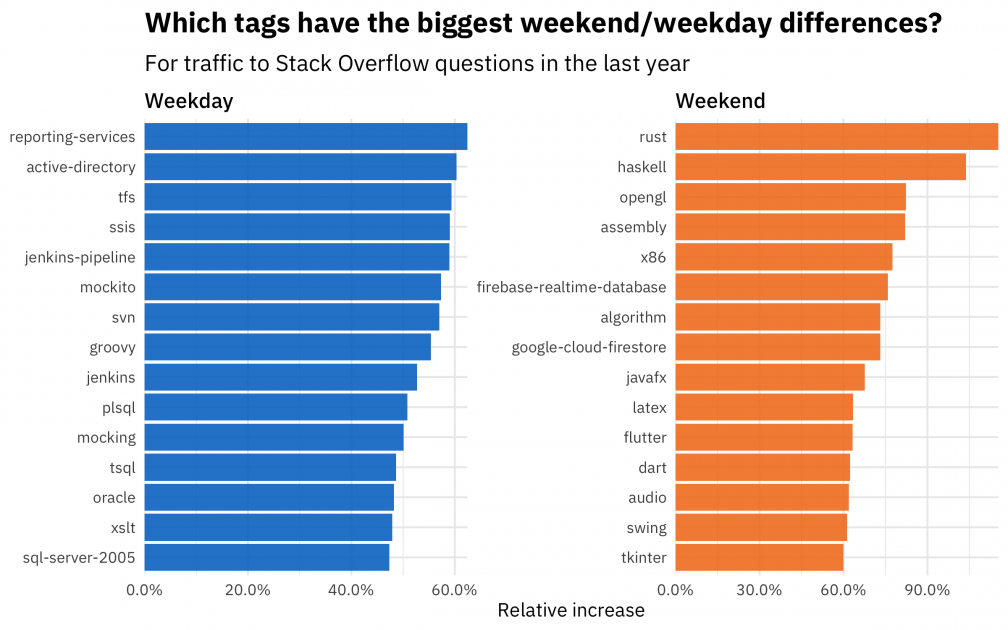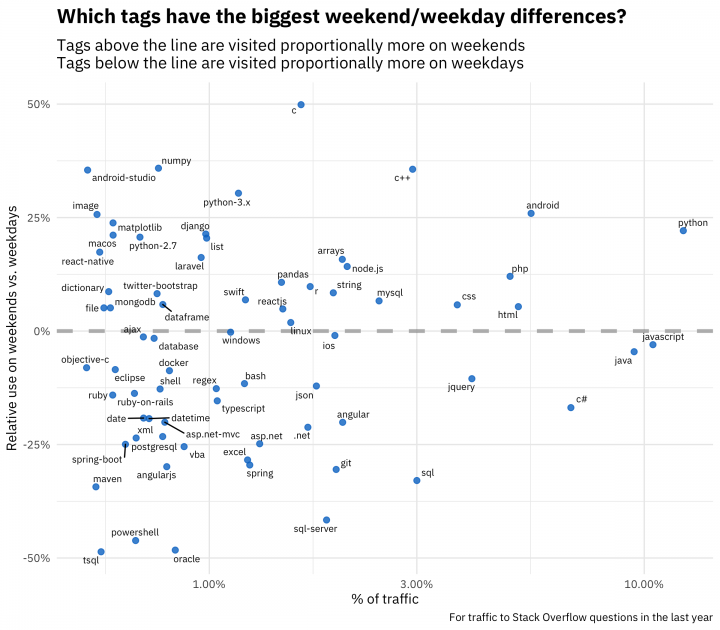Welcome to this month’s installment of Stack Overflow research updates! I code for work and for fun, on weekdays here at Stack Overflow as a data scientist and on the weekends as an open source maintainer. This is not uncommon. About 80% of respondents on our annual Developer Survey say they code as a hobby, and on my team, it turns out that every single one of us does a bit of coding for fun, whether that's live coding on Twitch, connecting C# to R Markdown because you can, or learning game development from scratch.
At the same time, as an industry, we're wrestling with what it means that this is the norm. Burnout is a huge problem in the tech industry, for one. For another, expecting developers, data scientists, and other people who code to have resumes rich with side projects and open source contributions is a barrier for hiring. It is a barrier for those who have caretaking responsibilities, those who have less free time because of financial or health issues, and those who have identities that have often been excluded from open source communities.
I honestly enjoy coding for fun, but I also see the ways my own circumstances have given me the time and space to do this, and then how that has benefited my career. People who code visit Stack Overflow all days of the week to find answers to their programming questions, whether those questions are related to their Tuesday morning at work or their weekend hobbyist project. Let's explore what kinds of technologies on Stack Overflow people are visiting on the weekends compared to the weekdays, and what that can help us learn.
Comparing tag visits
All technologies (well, close enough to all to say so) are busier on the weekdays than on the weekends; Stack Overflow is a site that gets dramatically more traffic on weekdays than on weekends. Over the past year, 86.5% of traffic to Stack Overflow questions has come on weekdays, more than you would expect given that there are five weekdays each week. We see evidence that people who code are taking time off on the weekends; there are many developers and other coding professionals who visit Stack Overflow very little or not at all on their days off as they pursue other interests or just rest.
That being said, we can look at differences in traffic to tags on Stack Overflow on weekdays compared to weekends, and learn about the mix of technologies that people are more likely to be thinking about, visiting, and using on weekends compared to the weekdays. We defined weekends as Saturdays and Sundays using UTC dates for this analysis, which may not exactly overlap the weekend for all users.

What is this plot showing? Let's compare the top two technologies on each side.
- The programming language Rust (this year's most loved programming language on the Stack Overflow Developer Survey) makes up 0.0623% of weekday Stack Overflow traffic, but 0.134% of weekend Stack Overflow traffic. That's a big difference! Proportionally, Rust makes up a lot more traffic on the weekends.
- Traffic to the SQL Server Reporting Services tag makes up 0.0877% of weekday traffic, but 0.0329% of weekend traffic. Proportionally, this tag is more prominent during weekdays.
The qualitative difference between these two tags is reflected down the line on both sides. On weekdays, we see proportionally more traffic to technologies that are used by people mostly in their day-to-day jobs, or that require expensive licenses. I don't know many people running Team Foundation Server out of their homes for fun, and evidence indicates that Subversion is not a dominant player for version control in open source these days.
On weekends, we see more open source technologies, as well as tech that people can more easily use on their own in their side projects. Flutter and Dart are open source technologies for mobile apps, and are currently among the fastest growing technologies on Stack Overflow as determined by questions asked. Some of the technologies we see used proportionally more on weekends are less about hobbyist projects and more about students, either undergraduate or graduate. I've spent enough time myself using LaTeX as an academic to find it difficult to believe anyone is using it "for fun."
Differences for most visited technologies
The previous plot shows us some technologies that exhibit very dramatic weekend/weekday differences, but let's look at some of the most visited technologies on Stack Overflow overall.

Notice that the x-axis is on a log scale.
In this plot, technologies that are above the dashed line are visited proportionally more on the weekends (i.e., make up a higher proportion in the mix of weekend traffic) and technologies that are below the line are visited proportionally more on weekdays. Tags that are further to the right are visited more (notice that Python now handily takes the top spot as the most visited tag), and tags that are further to the left are visited less often.
Technologies associated with expensive licenses, databases, and the Microsoft tech stack tend to be visited proportionally more on weekdays. People come to Stack Overflow to find answers about Oracle, SQL Server, SQL (the language), C#, and .NET on weekdays. Angular is now squarely a weekday technology, and I was surprised to see Git there as well. Don't forget to version control your side projects!
Python is not only visited at an enormous rate, but also visited proportionally a lot on the weekends. Python is being taught more and more in university classes, as are languages like C, C++, R, and others; we see strong annual seasonal trends from students that correspond to higher weekend traffic as well. Many of the technologies used proportionally more on the weekends are also technologies increasing in prevalence in jobs ads, illustrating how the freedom to grow skills on the weekends can contribute to career success.
Weekend warriors
I first explored an analysis like this during my very first months as a data scientist here at Stack Overflow, focusing on questions asked instead of traffic. I am still very interested in what this tells us about people who code and what our interests are like at work compared to outside of work. We just had a weekend, and I hope that the community and knowledge of Stack Overflow supported your weekend side projects well.
Or that you took a break.
